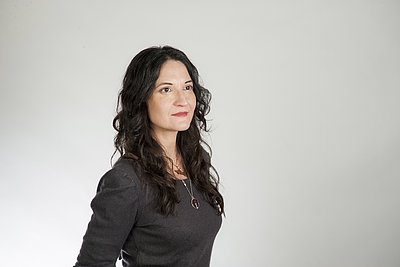Interactive Art and Posthuman thought
6. und 9. März 2020
Die Abteilung Interface Cultures lädt zum Workshop von Sandra Alvaro.
“Interactive Art and Posthuman thought” combines theory (lectures and in-class text commentaries) and practice (drawing networked diagrams) to illustrate the relationship between the evolution of interactive art -interfacing humans with machines- and the development of new frames of thought related with posthumanism and post-anthropocentrism.
This workshop aims to build a diagrammatics of the emergent system of thought named posthumanism to bring it closer to the art practice. Rosi Braidotti defines the posthuman turn as the convergence of posthumanism with post-anthropocentrism and relates it to the materialist philosophy by Deleuze and Guattari, the influence of indigenous philosophy and the feminist thought - represented by authors as Elizabeth Grosz, Karen Barad, Donna Haraway and Elizabeth Povinelly. Besides, to this evolution, we could add the influence of cybernetics in the thought of Simondon -also influencing Deleuze- and Katerine Hayles.
The work of these thinkers has evolved parallelly to artistic practice. The evolution of interactive art is bridged with the experimentation with new technologies and the proposal of forms of interfacing humans with machines. It shaped new systems of knowledge, information structures that progressively became embodied in computerized electrotechnical systems and hybridised with the human. These extensions of our body and intellect have evolved from the proposal of cyborgs to the creation of a new artificially intelligent other, the source of deep mediatization and control, otherwise a new creative collaborator. Artistic artworks had exemplified and accompanied this evolution showing the changes in the definition of the human, the environment and knowledge. We can quote the dematerialized networked cyborgs created by Tina Laporta, the cyborgian immersive representations by Jill Scott, the immersive spaces of knowledge created by Monika Fleishman and Wolfang Strauss or the Knowbotic Research Group finally, the autonomous interactive dancing entities by Simon Penny or the more recent co-singer trained by Tommony Adachi.
This workshop consists of two sessions. Each one including a short theoretical introduction illustrated with the commentary of artworks; a text commentary and practical work based on the methodology of diagrammatics -developed accordingly the definition of Deleuze and Guattari. In the sessions, the students will learn about the evolution of posthuman thought concerning art practice and will develop diagrams -working in groups and based in previously offered texts - of the posthuman conglomerates acting in our environment, acquiring an understanding of how they affect differentiated fields of our reality as the epistemology, finance, health and the human body, or the Anthropocene.
Content of the teaching program
Workshop 1 // Friday, 6 March 2020, from 12.00 to 17.00h
12.00 – 13.30 h. Humans + Non-Humans: Augmentation, Mediation and the New Other (introduction illustrated with the commentary of interactive artworks)
13.30 – 14.00 h lunch break
14.00 – 15.20 h Selected texts and authors of posthumanism (In-class commentary of selected texts, facilitated previously to the students by the teacher)
15.20 – 15.35 h. Coffee break
15.35 – 17.00 h. Diagram of the Posthumanism System (The text commentary will be accompanied with the drawing of a diagram, tracing the relations between artworks, artists, concepts and authors that link in the development of this thought system)
Workshop 2 // Monday, 9 March 2020, from 11.00h to 16.00h
11.00 – 12.30h Data visualization and Diagrammatics (Introduction of artistic works using diagrammatics methodology)
12.30 - 13.00h (Coffee break)
13.00 - 14.30h Selected texts and authors of posthumanism relating to Aesthetics, ethics, radical epistemologies, postcolonialism, postcapitalism and anthropocene (More focused workshop in which the students will be divided into groups and work in a text related to one of the themes proposed by the teacher)
14.30 – 14.45h Coffee break
14.45 – 16.00h Diagrams of everyday posthuman systems
(Each students’ groups will develop one diagram linking everyday objects, systems, situations that illustrate the complexity of the selected theme)
